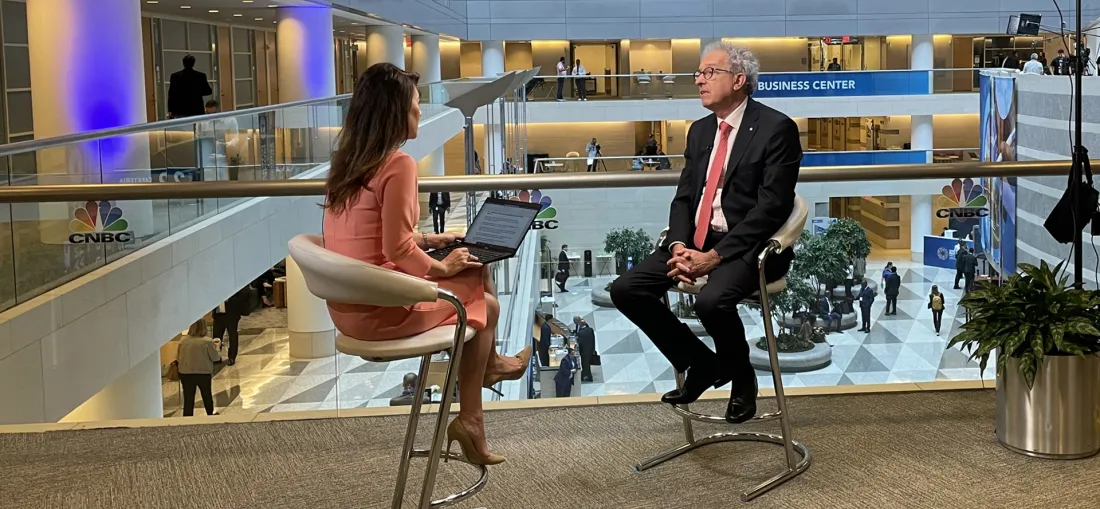Pierre Gramegna interviewed by CNBC

Interview with Pierre Gramegna, ESM Managing Director
Broadcast by CNBC, 17 April 2024
Interviewer: Karen Tso
CNBC: While work has been done to improve bank resolution in the last decade or so, more needs to be done on resolution. Do you agree?
Pierre Gramegna: The banking sector is much more resilient and stable than it has been in the past. This is particularly true in Europe. We have created a banking union in Europe, and bank resolution is on the top of our agenda. In fact, in the revised Treaty of the ESM, we have strengthened the banking union by introducing a backstop by the ESM for the Single Resolution Fund. So I think Europe in a way has a better toolkit than other areas of the world. But banking resolution is also often connected with finding a potential buyer, finding other ways. So we have a framework in place in Europe that I think is quite good.
What shape are European banks in at this point? Because it feels as though it's a much better position that they're enjoying now despite higher rates than what they've had in the past. But at the same point, they're paying out windfall taxes in some places. Also, you've got Spain to Ireland where these taxes are logged. So are they in good shape at this point?
If you look at their ratios, their capital ratios or their liquidity buffers, they're at highest level ever. So I think they are in good shape. And you can see that with the stock exchange value of all the banks. And you can also see that we had real proof of the resilience of the banking sector last year when we had financial turbulences in the United States and in large Swiss banks. In fact, there was a little bit of risk or a threat or thinking that eventually it could have a contagious effect on the EU banks, and it did not happen. I think we have weathered that crisis well. One needs not to be complacent, but obviously, the worries are less than they used to be.
Is there complacency by some governments by forcing banks to pay windfall taxes when they could be using that money to build resilience for the future?
Well, there have been a lot of protests by banks themselves. It is true that the profits of last year were historically high for most banks. And also, it depends on the modalities of this windfall tax. I understand that the shareholders and the banks are not happy about it. I agree with you that the most important thing is to have higher buffers for future crisis. We, as ESM, advocate that all the time. It's also true that in the Stability and Growth Pact that has been amended and will enter into force soon, Europe has really encouraged also countries, not only banks, to have buffers.
We had a big bank failure in Europe last year, Switzerland. We saw the Swiss forcing a merger between UBS and Credit Suisse. Some say regulators had all the tools they needed to deal with Credit Suisse, but simply we just didn't have the motivation. Are there lessons here as we take a look at that situation when it comes to banking regulation?
I think the case of Credit Suisse is a very special one. It's a huge international bank that is headquartered in a smaller country. It was so huge that even not only for Switzerland, even for many countries, it is very difficult to resolve such a bank. That is why I think in the European Union, we have a much better set-up, as we have joined forces to have a common reaction. We have a common supervision mechanism. We have procedures in place. We have the Single Resolution Fund that now has €80 billion that has been accumulated over the years. We have the backstop of the ESM when that will enter into force after the ratification by all countries. So I think that the set-up in Europe is quite good right now.
There are suggestions that Europe should also consider creating bigger banks. Whether it's a huge bank like we're seeing in Switzerland is one option or just more broader consolidation. What would that mean in terms of having a backstop in the event of failure of a much bigger bank?
Well, let's hope this doesn't happen I think the hot topic right now is even more to have a capital markets union that is stronger, more unified, more harmonised. The Eurogroup issued a statement on this a couple of weeks ago, and the President of the Eurogroup presented it to the heads of government. I think this is really one of the top items on the agenda of the new Commission and the new Parliament that will come out of the elections that are taking place in June. I think it's not only the size of banks, it's just having a very efficient and resilient capital market that is key right now.
How long is it going to take to have banking union and a capital markets union?
Well, you see, we are not that good in Europe in terms of communication. If you ask me, when are we to be finished with the capital markets union or the banking union, it always looks like we haven't done anything. If you look at the banking union, I would say that the glass is much more full than empty. On the capital markets union, you could argue that it's maybe best in the middle or slightly below. We really need to look what has been done over the last couple of years, and that's much more than, I think, is perceived.
I want to ask you how exposed Europe is in terms of the bailout fund in the event of crisis. Lawmakers in Italy, from Brothers of Italy to Lega, rejected reforms to ESM, [Prime Minister] Meloni calling it obsolete. Does that pose a threat in event of crisis?
Obviously, it is not good that the ratification by one country hasn't happened. The backstop, which we've talked about, which is an additional safety net, cannot enter into force. But we are in a dialogue with Italy to find a solution. On top of it, I think we must realise that together we are stronger than alone. I think there's a lot of discussions how the ESM could be used in the times of crisis, especially in the times of war in Ukraine, which would be a use that goes beyond what we're used to, because the ESM is there to help its member countries, the 20 countries that have the euro and not outside countries. But all these things are fluid and are being discussed. The point of Italy is to say we need an ESM that can be used on more occasions. Now, on one issue where we have already a solution, they are unfortunately not yet convinced.
Author

Contacts


